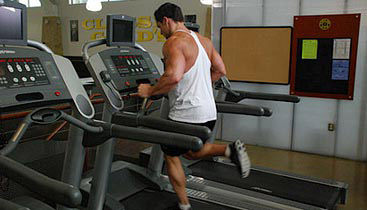DOES EMPTY STOMACH CARDIO BURN MORE FAT?
Bodybuilding and fitness trainees are always looking for that extra edge to help them pack on lean muscle and melt off fat at a faster rate.
Empty stomach cardio (typically performed first thing in the morning) has become a popular method over the years and is said to accelerate fat loss to a higher degree in comparison to having a pre-cardio meal first.
The logic behind this seems to make sense…
Since glycogen levels are low and no carbohydrates have been consumed for at least 8 hours, the body will be forced to utilize a higher percentage of body fat for fuel during the session.
As a result, you’ll lose body fat faster.
But does this really hold up in practice? Is empty stomach cardio truly superior?
Though some people swear by fasted cardio, from a pure fat burning perspective it doesn’t seem to produce any additional benefits above and beyond standard fed cardio.
While fasted cardio does increase lipolysis (the amount of fat that is broken down), it does not increase fat oxidation (the actual amount of fat that is burned for energy).
In other words, fasted cardio causes the body to break down more fat than it can actually use for energy during the session. In the end, the fatty acids that are not oxidized are simply re-stored in the body.
The limiting factor when it comes to leaning out and losing body fat is fat oxidation, not lipolysis.
Not only does empty stomach cardio NOT result in a greater amount of total fat loss, but there are a few reasons why it may actually be inferior…
First of all, it appears that consuming a meal prior to cardio increases the thermic effect of exercise.
The result is an increase in excess post exercise oxygen consumption (known as “EPOC” for short) due to a rise in thermogenesis, or calories burned as heat energy.
Secondly, a pre-cardio meal reduces the potential for excess muscle loss during the session.
Maintaining lean muscle should always be a primary concern during a cutting phase, and research has shown that nitrogen losses are nearly doubled as a result of empty stomach cardio.
Thirdly, for most people, a pre-cardio meal maximizes the overall intensity you can generate during your cardio session.
While this will likely not be an issue during low intensity steady state cardio, higher duration/shorter intensity sessions can definitely suffer when they are performed on an empty stomach.
What is the bottom line when it comes to empty stomach cardio?
Not only is it not going to help you burn fat at a faster rate, but it may actually be directly counterproductive due to a decrease in thermogenesis, increase in muscle loss and decrease in overall training performance.
If your goal is to maximize fat loss while maintaining as much lean muscle tissue as possible, you’re probably best to consume some protein and carbohydrates within a few hours of performing your cardio.
– Sean
Here’s what to do next…
If you found this article helpful, make sure to sign up for your FREE custom fitness plan below...





